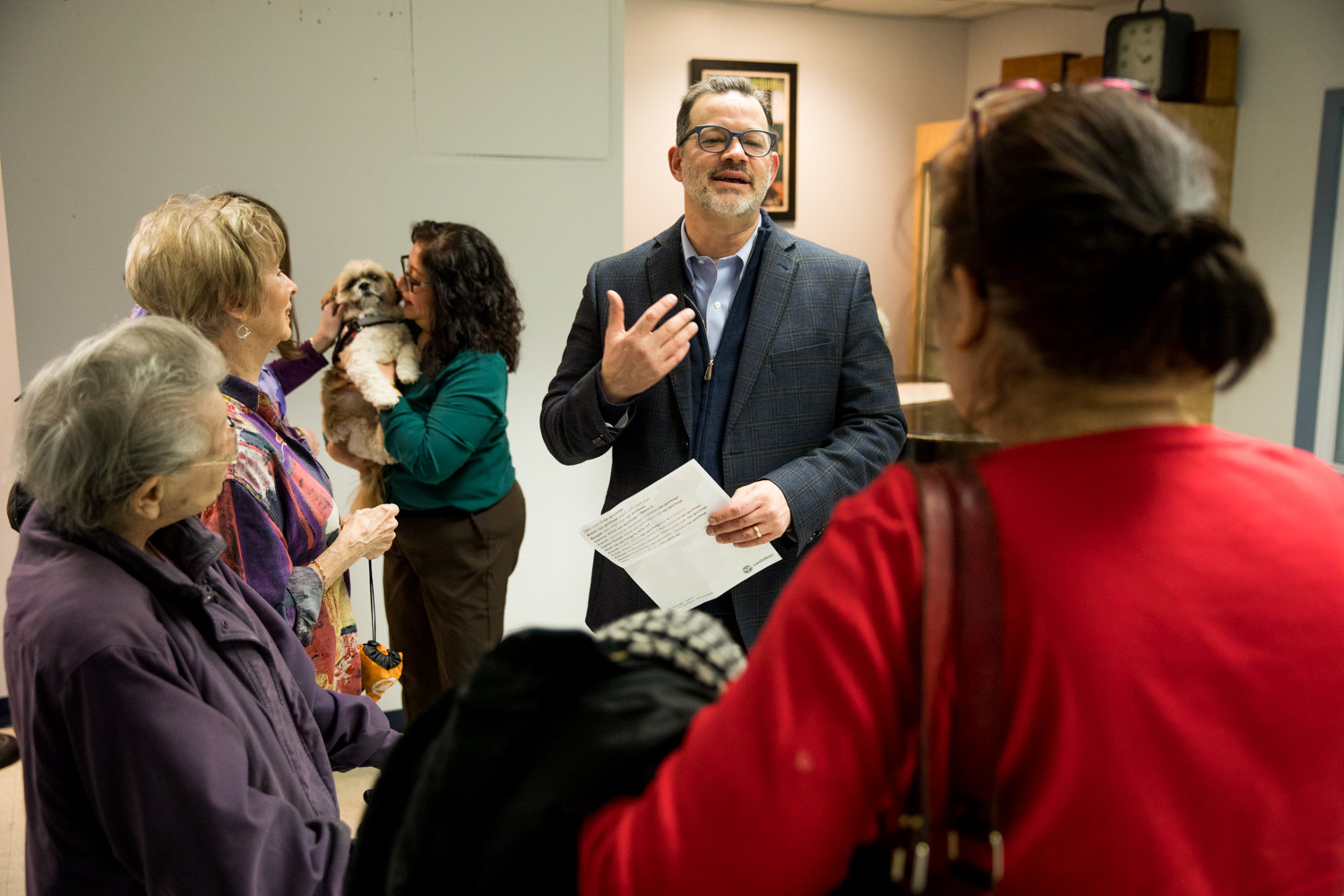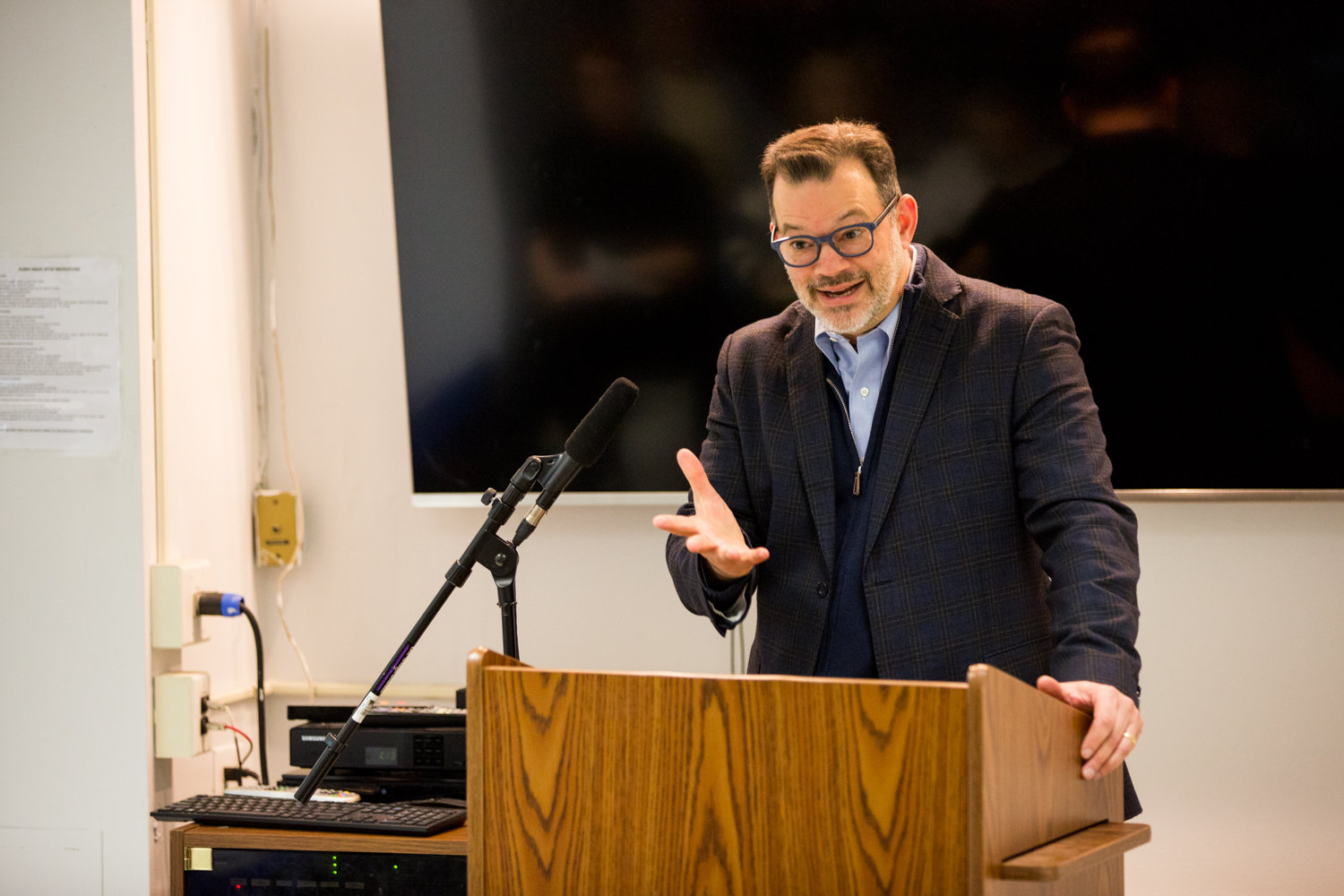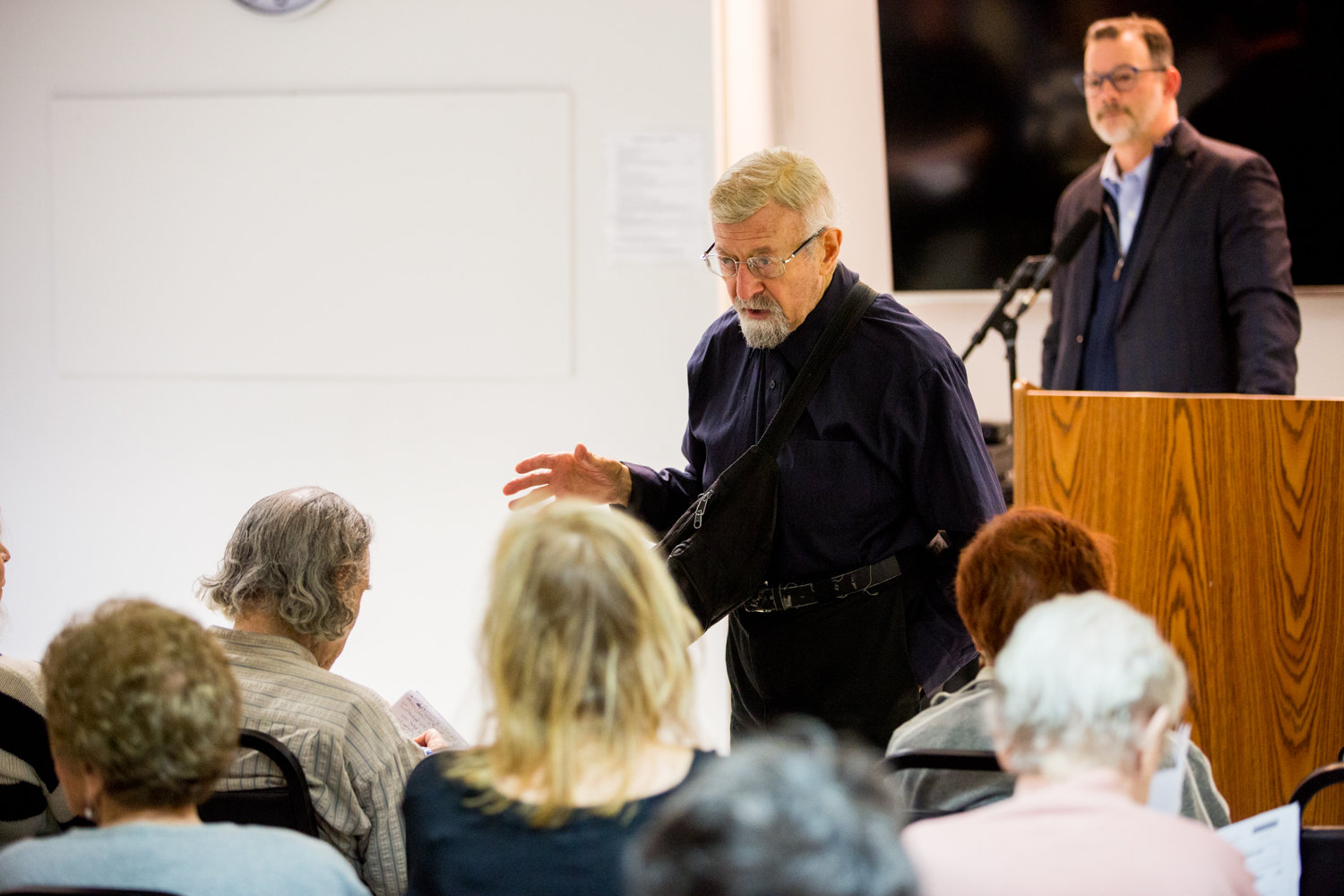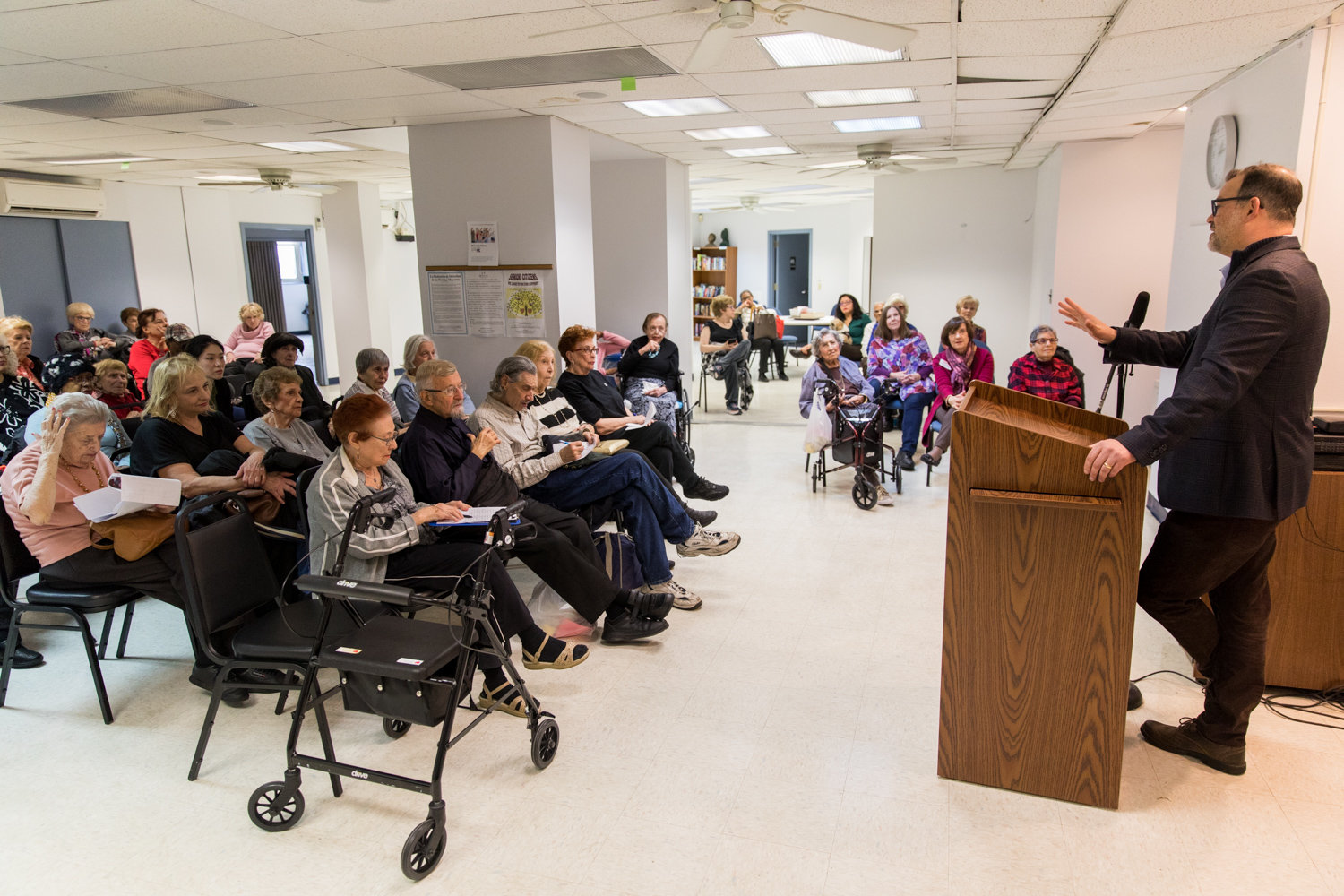Seniors, Cohen gab about problems in neighborhood
Sometimes television makes being an elected official look exciting. Glamorous even. But not everything is as cutting edge as “The West Wing” made it look back in the day.
In reality, being the person who speaks and makes decisions for constituents means fielding some tough questions. Sometimes it’s getting out of City Hall and into community meetings with people who bring unanswerable situations. And often it’s communicating what’s being done and how the slow wheels of government will eventually arrive at an equitable solution.
Councilman Andrew Cohen stepped outside of City Hall, fielding questions from a crowd gathered at an RSS-Riverdale Senior Services forum Feb. 7.
The hot topic of the day was about the shortcomings of public transportation in the northwest Bronx, but other grievances got their time in the sun. Lack of retail shopping. Free entrance to parks and zoos. School overcrowding. Even farmers markets. There was a lot on the minds of these senior citizens, but conversation repeatedly came back to what the devil to do about late buses.
“The MTA is controlled by the state, but there has been a real effort to try to make the stations accessible — subway and Metro-North,” Cohen said.
But the best the city council can do is harangue the state over the current condition of the country’s largest public transportation network.
Audience members bemoaned the lack of access to the Spuyten Duyvil Metro-North station. Located at the bottom of the hill on Edsall Avenue, pedestrians are forced to take Bradley Terrace to the station — a steep step street connecting Edsall to Palisade Avenue.
Rail Link buses don’t stop on Palisade, so people with limited mobility who live nearby have few options for getting to the station. If they make it there, the station itself isn’t compliant with the Americans with Disabilities Act.
But the huge cost to retrofit Metro-North stations as well as century-old subway stations with elevators, ramps and other accessibility improvements has made progress slow, Cohen said. It may take a decade to get the entire system ADA -compliant.
“It is a very complicated, brutally expensive effort to make these stations accessible,” he said.
Regarding bus service, Cohen said he often hears from people about problems.
“In the age of social media, (people) love to contact my office in real time and let me know about what a terrible experience they’re having,” Cohen said. “And really, the only thing I can do is relay those complaints directly to MTA.”
Introduced last year, the MTA’s Bronx bus redesign plan originally called for drastic reductions in express bus service. The news caused a ruckus. Proposed changes would have meant longer waits and cutting off-peak routes. That would have hit seniors especially hard because they can’t always do multiple bus transfers headed south to Manhattan. Taking a local bus to the 1 train would be their only other public transportation option, but they’d be out of luck if the elevators at the West 231st Street station are out of order.
“Nothing is going to happen to the express bus for at least another year,” Cohen said. That’s due in part by the community uniting to oppose the plan.
A rally last November that included elected officials like Cohen sent the MTA a clear message not to touch bus routes in areas where they work, the councilman said.
Filling in those potholes
But buses and trains weren’t the only things on the minds of those frequenting RSS. The pocked and patched streets of Riverdale’s estate district also make getting around a headache, both by car and foot. Pedestrians have fallen on the rough streets surrounding Wave Hill, and some are curious why the city doesn’t maintain the roads.
The problem is that many of those roads are privately owned. Years ago, a number of neighborhood associations lobbied the city to keep streets and some of the sewer system in the estate district private, Cohen said. But over time, those organizations stopped maintaining the roads themselves.
“Before I was born, there used to be a number of associations in that part of Riverdale that maintained the streets,” he said. “There were a number of these community groups. They were very big estates there, and they kind of agreed to work collectively to maintain the roads.”
For years, the city’s transportation department made basic repairs, like filling potholes and strip paving. But full city takeover to modernize and maintain the streets is complicated.
“We’re close to having a master plan to come up and deal with private streets,” Cohen said.
“It’s not just my district. This is a condition that exists in parts of Queens, parts of Brooklyn.”
But that solution will take time. The city has to slowly buy the roads from whatever entity owns them, he said, and then decide what road design would best fit the neighborhood’s character.
“The city, again, having to acquire the property in and of itself is a big project,” Cohen said. “The city’s not going to repair a street they don’t own.”
Finding more retail options nearby
Several people bemoaned the lack of good shopping in North Riverdale. Johnson Avenue, Knolls Crescent and Riverdale Avenue are the main retail areas in this corner of the Bronx.
The same few people own many of the properties in those areas, and Cohen didn’t have many good things to say about them.
The commercial real estate owner in each location has either ignored his office’s outreach, the councilman added, or have rudely told him to mind his own business.
“And they’re terrible, terrible landlords, and they don’t care about the community,” Cohen said.
“But I don’t have a lot of leverage over them.”
Many property managers keep storefronts vacant, hoping a large national chain will come scoop up the lease for the landlord’s asking price and do major renovation of the aging buildings before moving in. Both the city and the state governments have been working on a “vacancy tax” that would incentivize keeping a space filled instead.
One audience member asked Cohen why Montefiore Medical Center dropped plans to build an ambulatory care center on Riverdale Avenue at West 238th Street. It’s hard for folks in the neighborhood to find a doctor’s office open on the weekends, he said. Medical attention on Saturday and Sunday means a trek across the Bronx.
Cohen has not supported Montefiore building on Riverdale Avenue, even joining Assemblyman Jeffrey Dinowitz at a news conference last November to denounce rumored plans to build a 14-story medical center in what he described as the crowded retail district.
“I met with Montefiore very recently,” Cohen said. “They don’t want to build right now here at all. That story that they were coming back was patently false.”
Simone Healthcare Development, the company that hoped to construct the tall medical center in what the councilman described as an already overbuilt neighborhood, owns the lot. When people living nearby heard about the center six years ago, a grassroots movement arose. Ultimately, Dinowitz and then-state Sen. Jeffrey Klein passed legislation that specifically blocked Simone’s development. The law was later repealed.
“In order for (Simone) to make a lot of money, they need Montefiore to agree to lease it and buy it from him,” Cohen said, “which has not happened.”













